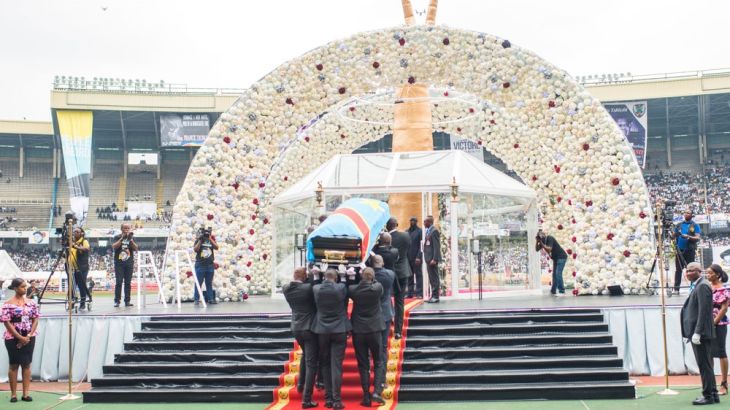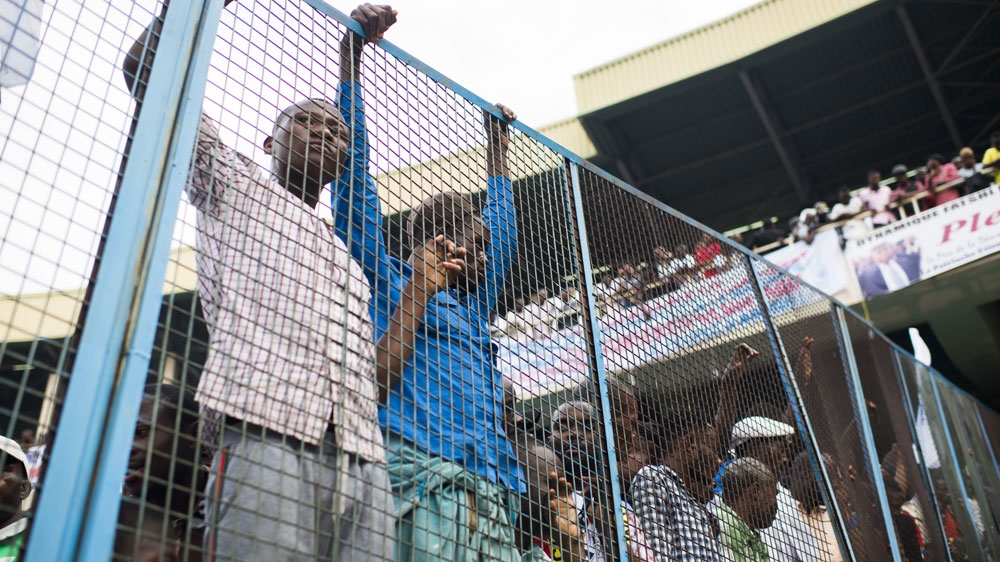‘Father of democracy’: DRC’s Etienne Tshisekedi laid to rest
The veteran opposition leader’s body repatriated two years after he died, as DRC government accords him a state funeral.

Kinshasa, DR Congo – More than two years after his death in Brussels, Etienne Tshisekedi‘s body was repatriated to the Democratic Republic of the Congo, where he was finally laid to rest in the land of his ancestors.
Etienne was a towering figure in the Congolese political scene. Briefly appointed prime minister in the 1990s, he was considered an eternal opponent.
Keep reading
list of 4 itemsIn protests-hit DRC, a fierce power struggle deepens
DRC PM lashes out at ‘arbitrary’ detention of justice minister
New DRC president pardons about 700 political prisoners
For four decades, he denounced successive government’s abuses, first under the self-proclaimed “Marshal-President” Mobutu Sese Seko, then Laurent-Desire Kabila and finally Joseph Kabila – Laurent Kabila’s son.
The veteran opposition leader was stubborn, quick-tempered and often impulsive – a personality that was far from flawless and deemed unpredictable by many.
Among those who came to pay a tribute on Saturday was Jean Lebosomo, a civil servant and member of Union for Democracy and Social Progress (UDPS), the party Etienne had founded, with others, in 1982.
Jean had a shirt made for this event, with the face of his “hero” printed on it.
“He was the father of democracy,” he said. “He taught us not to fear, and to fight for our rights,” he said.
“He didn’t have the opportunity to enjoy the results of his struggle, but we will follow the path he made for us.”
Affectionately nicknamed “le vieux” (“the old man”) or “leader maximo” by his supporters, he was very popular in Kinshasa.
The capital was his stronghold, the headquarters from where he led his political resistance for 40 years.
Etienne died of pulmonary embolism (a disease of the lung) at 84, on February 1, 2017, in a hospital in Brussels – the capital of the former colonial power Belgium.
At the time, political tensions were high in DRC and the veteran leader was in the middle of a long and exhausting confrontation with then-President Joseph Kabila, who delayed polls multiple times, extending his stay in office.
‘Fought for several decades’
But even after his death, Etienne was still perceived as a threat by the authorities.
For two years, his body had been kept in a mortuary in Brussels, awaiting permission from the Congolese government to be repatriated home.
“It would be a recognition of the noble cause he carried,” said Nathan Tshinkunku, one of his grandnephews. He fought for several decades “for our rights and for the rise of democracy in DRC”.
If Etienne has finally been able to return to Kinshasa and receive a state funeral, it is because his son, Felix Tshisekedi, was proclaimed the winner of the December 2018 presidential election.
Felix, 55, was sworn in as president in January in the first peaceful handover of power since the country’s independence in 1960.
|
|
Felix’s ascent to power came after very contested results and following a secret agreement of power-sharing with Kabila who left the presidential chair, but still holds the reins of many key sectors. A compromise, many whisper, Etienne himself would have opposed.
Felix positions himself as his father’s political heir, wearing the same trademark flat cap.
The two-day funeral, during which the president didn’t speak publicly, fulfilled one of the first promises he made in office.
Dignitaries of the Catholic Church, representatives of the UDPS attended, as did several African heads of states, including Rwandan President Paul Kagame.
“We forgive those who offended you,” said the eldest of Etienne’s granddaughters. The deceased could be made a “national hero”.
Relaying the torch
The state funeral was organised after several delays and the 80,000-seat Martyrs of Pentecost Stadium in Kinshasa, where the ceremonies were held, was never full.
A few thousand people had gathered around the roads to see the hearse passing, carrying the mortal remains, in a black coffin covered with the Congolese and the UDPS flags, to their last resting place.
It was nothing compared with the huge crowds that Etienne could mobilise during his lifetime.

Some wondered if people in the capital grew tired of waiting for his body to return or an expression of a lack of enthusiasm for the new president.
UDPS members attending the funeral fondly remembered him.
“He was a man of principles, deeply rooted in his convictions. He wasn’t someone who wanted to make sure that his son would be the one succeeding him as the head of the party after his death,” a party member, who declined to be named, said.
Albert Moleka, his former head of cabinet, said: “Now Felix must find his own way to lead.”
Martin Fayulu, one of the presidential candidates, who still disputes the results, paid tribute to Etienne’s “fight for democracy and justice”, but said he wouldn’t attend the funeral.
Etienne was buried in an unachieved $2.5m mausoleum in Nsele on the far outskirts of Kinshasa.
|
|